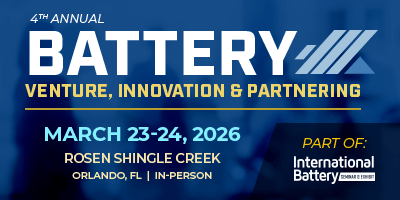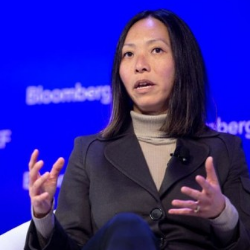2025 Final Agenda
Battery Venture, Innovation & Partnering
Financing Innovation & Commercialization of Emerging Technologies
March 18-19, 2025
The Battery Venture, Innovation & Partnering conference will be held in conjunction with the 42nd Annual International Battery Seminar & Exhibit, a successful and established technical event of 2,000+ delegates.
In recent years, it has become increasingly difficult for battery start-ups to raise cash and find alternative sources of capital, a stark change from just a few years ago. The trend toward LFP and lower cost batteries coming out of China, the slowdown of the EV market, and political uncertainty all add to the challenges in the financial markets.
It’s never been more critical to bring together leading battery innovators—CEOs/founders, early and late-stage investors, with corporate executives from both the battery and the automotive side, to discuss what the future of financing and innovation looks like for batteries, and what companies need to do to survive and thrive, particularly in the US.
Tuesday, March 18
Registration Open and Morning Coffee
Organizer's Welcome Remarks
Capital Markets and Capital Raising in the Battery Industry Today
 Alexandra Manoloff, Head of Battery Coverage for North America, Barclays Investment Bank, Energy Transition Group
Alexandra Manoloff, Head of Battery Coverage for North America, Barclays Investment Bank, Energy Transition Group
For battery companies, one of the fundamental barriers to or drivers towards success is the ability to raise capital. This has always been the case, but in today’s environment, many would agree that its importance seems amplified. This presentation will discuss key dynamics surrounding capital markets, highlighting insights from 2024 and looking ahead into 2025, and frame the environment for raising capital in the battery industry today. Through a lens that’s affected by inputs from both the buyside and sellside, an investment bank can offer unique perspectives on key focus areas in capital raising, and help all parties work together to build a constructive path forwards.
Beyond the Spark: The Future of Early-Stage Battery & Climate Ventures
Libby Wayman, Partner, Breakthrough Energy Ventures
This panel will dive into the evolving landscape of venture investing in breakthrough battery and climate technologies. This panel will explore critical questions shaping early-stage investment, including how to identify scalable innovations, the impact of regulatory shifts on venture strategies, and approaches to achieving both environmental impact and commercial viability. Join us as we discuss the unique challenges and opportunities within this space, from securing early traction and forging strategic partnerships to the role of emerging technologies in accelerating decarbonization and energy transformation.
Networking Coffee Break
Late-Stage Investment—Scaling to Success
Michal Wolkin, Former Director, GM Ventures; Board Member; Professor, Reichman University
The panel will cover how financial institutions are shaping their investment strategies to support tech companies scaling up high-capacity battery production for stationary storage and EVs. We’ll address key market dynamics and challenges, including supply chain disruption, competition, geopolitics, regulatory changes, interest rates, and financing requirements. We will also highlight the recent IRA government incentives, new investments opportunities, and emerging growth areas in the battery sector.
Beyond Late-Stage Investing in Batteries
Nathan Niese, Managing Director, Partner, Electrification & Climate Change, Boston Consulting Group
What battery and broader cleantech investment learnings of the past 1, 10, and 20 years are shaping how investors look at the next wave of opportunities? What are the expected roles of growth equity, climate infra vehicles, project financing, and/or public offerings as the battery market expands and matures? How are investment appetites evolving as we witness increasingly fast technology cycles and geo-political change? Join our fireside chat to hear answers to these questions and more.
 Turning Your Battery Technology into a Product with Electria Group
Turning Your Battery Technology into a Product with Electria Group
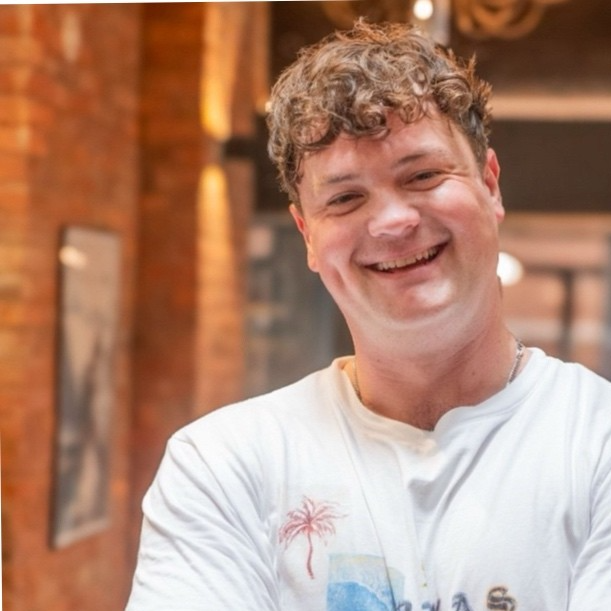 Jack Hulse, Co-Founder & Head of Product, Electria Group
Jack Hulse, Co-Founder & Head of Product, Electria Group
Many great technologies and materials with huge implications for the industry don't make it to market. We've been working with battery start-ups and investors to bring more products to market. In this presentation we highlight some common themes and how to overcome them.
 Paige Johnson, CEO, Ten Nine Technologies LLC
Paige Johnson, CEO, Ten Nine Technologies LLC
The battery industry is at a crossroads—innovation is vital, but so is efficiency. For lean start-ups, navigating the complex ecosystem of technology development, funding, and market competition can feel like an uphill battle. In this session, Ten-Nine Tech's CEO Paige Johnson will explore strategies for building a lean battery start-up that not only survives but thrives -- even in the most difficult times. From creating a focused, high-impact product roadmap and team to securing strategic partnerships and maintaining agility, her discussion will highlight actionable steps for founders and investors aiming to maximize their resources while accelerating growth. You will learn how to balance innovation with operational efficiency and how to stay resilient in an evolving industry, ensuring startups can weather challenges and capture market share in a fast-paced, competitive environment.
Networking Luncheon
Organizer's Remarks
Driving the Future: Innovations and Investments in the Automotive Industry
Stefon Crawford, Partner, General Motors Ventures LLC
1. Emerging Technologies:
Electric Vehicles (EVs) and the shift towards sustainable transportation.
2. Investment Trends:
Key areas attracting venture capital in the automotive sector.
Success stories and lessons learned from recent investments
3. Challenges and Opportunities
Overcoming barriers to widespread EV adoption.
4. Future Outlook:
How VCs can support the transition to a more sustainable and technologically advanced automotive landscape.
Strengthening U.S. Battery Supply Chains: Meeting the Demand for ESS and EVs
Erez Ichilov, Founder, Cedrus Arbor LLC
This panel will address the growing demand for lithium driven by energy storage systems (ESS) and electric vehicles (EVs) and the need to build a robust domestic supply chain. Discussions will focus on securing critical materials through innovative financing, adapting to global trade shifts, and fostering collaboration across refining, recycling, and manufacturing sectors. Panelists will explore strategies for creating a sustainable and resilient supply network to support future growth.
Session Break and Transition to Roundtable Breakouts
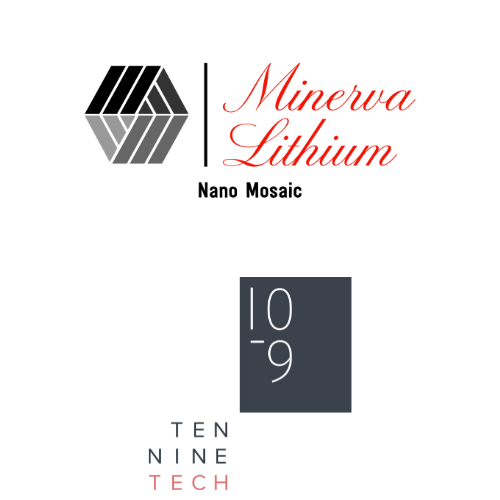
Roundtable Discussions are informal, moderated discussions, allowing participants to exchange ideas and experiences and develop future collaborations around a focused topic. Each discussion will be led by a facilitator who keeps the discussion on track and the group engaged. To get the most out of this format, please come prepared to share examples from your work, be a part of a collective problem-solving session, and participate in active idea sharing.
TABLE 1: Building a Lean Battery Start-Up
Moderator: Paige Johnson, CEO, Ten-Nine Technologies
TABLE 2: How to Build a Domestic Battery Supply Chain in US
Moderator: Sheeba Dawood, CEO & Co Founder, Energy Sector, Minerva Lithium
PLENARY KEYNOTE
Can We Have a Safe Lithium-Metal Battery?
 Shirley Meng, PhD, Director, Energy Storage Research Alliance (ESRA), Argonne National Laboratory; The Liew Family Professor, The University of Chicago
Shirley Meng, PhD, Director, Energy Storage Research Alliance (ESRA), Argonne National Laboratory; The Liew Family Professor, The University of Chicago
Along the pathway beyond 500 Wh/Kg, enabling lithium-metal anodes becomes a must. In this talk, I will introduce a new framework with which we can design lithium-metal anodes not only for high energy and long cycling, but also for safe operation. The design rule for possible anode-free architecture will also be discussed.
The Importance of Passive Propagation Resistance in Battery Pack Design
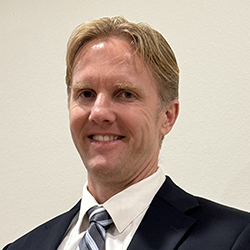 Troy Hayes, PhD, Director of Quality, Tesla
Troy Hayes, PhD, Director of Quality, Tesla
More than 30 years after the first Li-ion battery was produced, random thermal runaway events still occur in the field. Despite the low probability of such incidents at the cell level, the volume of cells in EVs dictates that manufacturers must prepare for these occurrences. Ensuring that this does not create a significant risk to vehicle occupants is crucial and is a fundamental aspect of battery pack design. This talk will discuss the importance of passive propagation resistance and the rigors of testing given the stochastic nature of Li-ion battery thermal runaway.
A Comprehensive Analysis of Modern Silicon-Carbon Nanocomposite Negative Electrode Materials for Li-ion Batteries
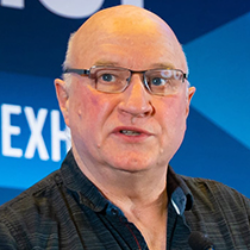 Jeff Dahn, FRSC, PhD, Professor of Physics and Atmospheric Science, NSERC/Tesla Canada Industrial Research Chair, Canada Research Chair, Dalhousie University
Jeff Dahn, FRSC, PhD, Professor of Physics and Atmospheric Science, NSERC/Tesla Canada Industrial Research Chair, Canada Research Chair, Dalhousie University
There is a huge world-wide push to develop and manufacture modern Silicon:Carbon nanocomposite materials (Si:C) for Li-ion batteries. There are a handful of companies in the US (e.g. Sila, Group 14, etc.), several in Europe as well as OVER 70 companies in China developing and/or manufacturing such materials. Why is this happening? In this lecture I will describe the structure and properties of modern Si:C materials and show why they are so attractive compared to earlier alternatives. The best materials show specific capacities near 2000 mAh/g, first cycle efficiencies near 90%, very little irreversible swelling during charge-discharge cycling and compatibility with simple binders like CMC/SBR. The best materials can be used with typical Li-ion battery electrolytes with common electrolyte additives. We will show results for Li-ion pouch cells containing 20% and 50% by weight of Si:C (balance graphite) where impressive cycle life has been achieved. Energy density increases over "graphite-only" cells are very significant. All the Si:C materials we have tested show large REVERSIBLE volume changes which means that significant care must be taken in cell design.
This and Next-Generation Battery Development—A UK Perspective
 Martin Freer, PhD, CEO, Faraday Institution
Martin Freer, PhD, CEO, Faraday Institution
The UK government set out a battery strategy in 2023 targeting the three elements, including design and development of the batteries of the future as well as strengthen the resilience of UK manufacturing supply chains and enabling the development of a sustainable battery industry. This is matched by a significant delivery program associated with the Faraday Battery Challenge, including the Faraday Institution which coordinates the UK's battery research program. This presentation will provide an overview of the UK's battery strategy, the development of associated research programs, and highlight future focus areas for research and innovation.
Reception in the Exhibit Hall with Poster Viewing
Close of Day
Wednesday, March 19
Registration Open and Morning Coffee
Li-ion and Na-ion Technology: Meeting the Growing Demand for BESS in Grid and Data Centers as Energy Solutions
 Katherine He, Investor, TDK Ventures Inc.
Katherine He, Investor, TDK Ventures Inc.
The rapid evolution of energy storage systems (ESS) is revolutionizing how we address the growing energy demands of modern infrastructure. This talk will explore the critical role of Li-ion and Na-ion battery technologies in advancing grid-scale and data center energy solutions. With a special focus on AI-driven data centers, which demand scalable, efficient, and sustainable power strategies, we will examine how Battery Energy Storage Systems (BESS) are shaping the future of energy resilience. The discussion will delve into technological innovations, market growth, and the strategic importance of BESS in enabling a seamless transition to smarter, greener energy systems.
Meeting the Growing Demand for Energy Storage Systems (ESS)
Marc Kolb, Partner, Boston Consulting Group
What is driving the demand for Energy Storage Systems (ESS) and where do we see the market going in the coming years? The panel will explore the current and future ESS market, to include discussing the potential for sodium-ion and other emerging technologies.
 Building the Fastest and Lowest-Cost Manufacturing Platform for Better Batteries
Building the Fastest and Lowest-Cost Manufacturing Platform for Better Batteries
 Rajan Kumar, CEO & Founder, Ateios
Rajan Kumar, CEO & Founder, Ateios
Ateios Systems has developed the fastest, most cost-effective, and circular electrode manufacturing process needed to build better batteries. By replacing the traditional energy-intensive, solvent-based process with energy curable composite, the drop-in platform technology reduces costs by 30%, eliminates forever chemicals, and enhances battery performance. With $B+ production capacity already underway, with multiple partners using a fabless model, the company is actively raising $8.5M to be able supply better electrodes to the entire $120B lithium-ion battery market.
 "Powering the Future: Sustainable Lithium Recovery & Circular Battery Supply Chain"
"Powering the Future: Sustainable Lithium Recovery & Circular Battery Supply Chain"
 Sheeba Dawood, CEO & Co Founder, Energy Sector, Minerva Lithium
Sheeba Dawood, CEO & Co Founder, Energy Sector, Minerva Lithium
As the demand for lithium surges, North America faces critical challenges in securing a sustainable and cost-effective supply. Minerva Lithium introduces Ultra-Lithium Recovery (ULR) technology, an advanced direct lithium extraction (DLE) and black mass recycling solution that enhances efficiency while reducing environmental impact. By integrating sorbent-based lithium recovery with circular supply chain strategies, Minerva Lithium is building a resilient, domestic battery ecosystem to power the future.
Looking Back on Past Success & Looking Forward to the Future with Denise Gray
Michal Wolkin, Former Director, GM Ventures; Board Member; Professor, Reichman University
In this fireside chat, Michal Wolkin and Denise Gray, both accomplished technical leaders in battery technology, will explore Denise’s remarkable journey as a pioneering executive woman in the energy storage industry. They will discuss how her career began, the challenges she overcame, and her leadership roles at GM, LG Energy Solution, Ativa and DOE across continents USA , Europe and China. Together they will discuss the evolution of battery technology, the interplay between industry, government, and geopolitics, and the global race for energy storage innovation and cost reduction. The conversation will also address the change in U.S. battery investments and manufacturing in light of recent government changes, examining how policy shifts may impact the country’s competitiveness in the global energy transition. Highlighting shared experiences as women breaking barriers in a male-dominated field, they will reflect on lessons learned and advice for the next generation, particularly encouraging young women to enter STEM fields. The discussion will celebrate Denise’s groundbreaking contributions and examine the role of batteries in EV electrification, sustainability, and achieving net-zero goals.
Networking Coffee Break
EV Market Review—What Is the Impact on the Battery Market
Drew Prekop, Director, Global Industrial Investment Banking Group, Baird
While the pace of EV growth has slowed, investors and battery technology companies navigate challenging market conditions and political uncertainty in order to advance the EV supply chain. The panel will discuss how the environment has shaped their approach to investing/risk appetite, innovation and execution, including the role of partnerships.
Emerging Technologies & the Need to Continue to Invest in Innovation
Josh Stiling, Investment Director, Anzu Partners
This panel will discuss which next-gen chemistries, emerging technologies and processes, are most exciting right now, how receptive existing corporate players are to investing in emerging companies, and which areas need further investment. We will hear about lessons learned and advice for those starting out.
Networking Luncheon
Dessert Break in the Exhibit Hall with Poster Viewing
Close of the Battery Venture, Innovation & Partnering Conference
